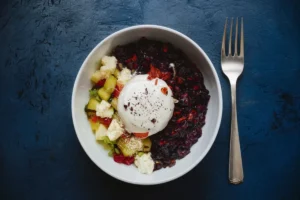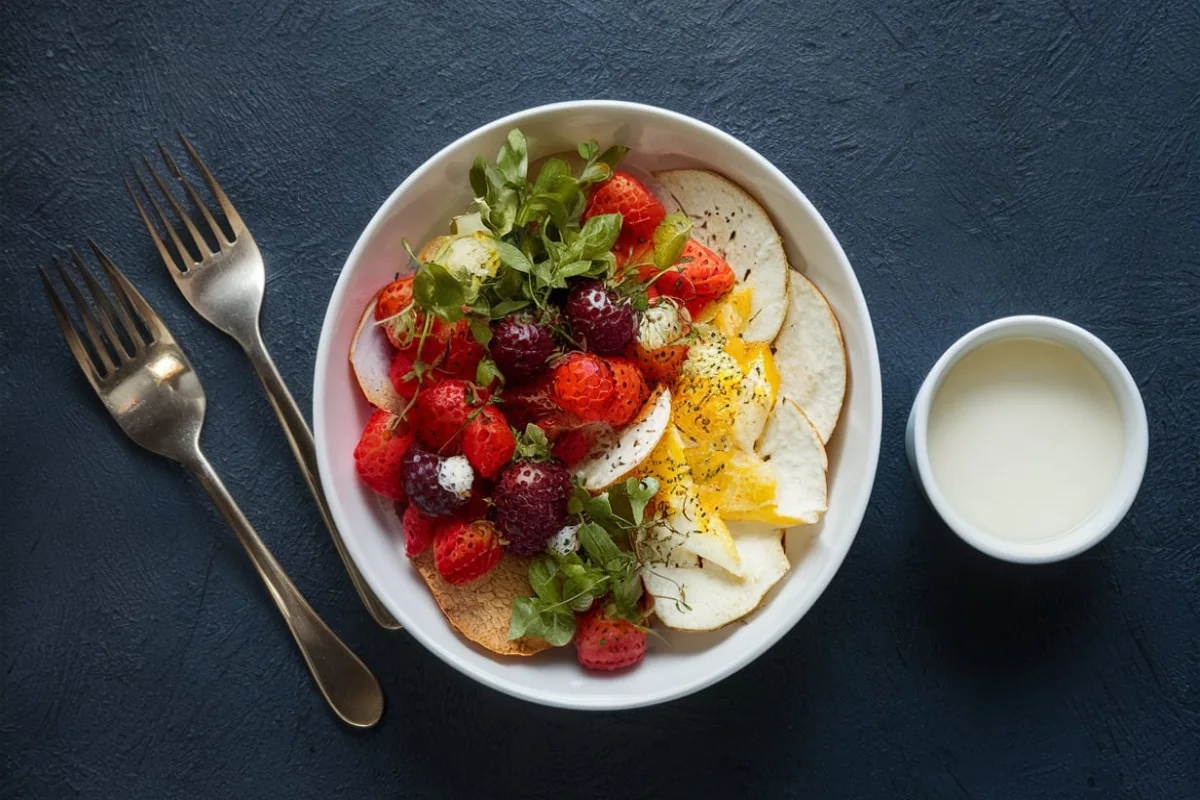Introduction
A low calorie breakfast is an excellent way to start the day on a healthy note without compromising on taste or satisfaction. Opting for breakfast options that are low in calories but high in nutrients can help you maintain your weight, boost your metabolism, and provide the energy you need for a productive day. This guide will explore the benefits of low-calorie breakfasts, provide a variety of meal ideas, and share practical recipes to make your mornings healthier.
Table of Contents
| Heading | Subheadings |
|---|---|
| Introduction | Overview of Low-Calorie Breakfasts |
| Benefits of Low-Calorie Breakfast | Weight Management |
| Increased Metabolism | |
| Nutrient Density | |
| Low-Calorie Breakfast Options | Fruit-Based Breakfasts |
| Vegetable and Egg Dishes | |
| Smoothies and Shakes | |
| Yogurt and Cottage Cheese | |
| Low-Calorie Grains | |
| Low-Calorie Breakfast Recipes | Berry and Spinach Smoothie |
| Veggie Omelet with Salsa | |
| Greek Yogurt with Fresh Fruit and Nuts | |
| Overnight Oats with Almond Butter | |
| Avocado Toast on Whole-Grain Bread | |
| Tips for Preparing Low-Calorie Breakfasts | Meal Prepping for Success |
| Balancing Macronutrients | |
| Quick and Simple Recipes | |
| Expert Insights | Nutritionist Tips |
| Fitness Expert Advice | |
| Future Outlook | Trends in Low-Calorie Diets |
| Innovations in Breakfast Foods | |
| Conclusion | Recap of Key Points |
| Final Thoughts and Recommendations |
Introduction
Overview of Low-Calorie Breakfasts
A low-calorie breakfast doesn’t mean sacrificing flavor or satisfaction. It simply involves choosing ingredients that are nutrient-dense yet light on calories. Starting your day with a low-calorie meal can support your health goals, whether you’re looking to manage your weight or just want to incorporate more nutritious foods into your diet. Low-calorie breakfast ideas can be both delicious and fulfilling, providing essential vitamins and minerals without the extra calories.
Benefits of Low-Calorie Breakfast

Weight Management
One of the primary benefits of a low-calorie breakfast is its role in weight management. Eating a breakfast that’s lower in calories helps control your overall calorie intake for the day. By choosing foods that are filling yet low in calories, you can avoid overeating later on.
Increased Metabolism
Consuming a low-calorie breakfast can kickstart your metabolism, leading to more efficient calorie burning throughout the day. Foods that are rich in protein and fiber can further enhance this effect, as they require more energy to digest.
Nutrient Density
Low-calorie breakfasts often emphasize nutrient-dense foods that are packed with vitamins, minerals, and other essential nutrients. This focus ensures you get the most out of each calorie consumed, supporting overall health and well-being.
Low-Calorie Breakfast Options
Fruit-Based Breakfasts
Fruits are naturally low in calories and high in essential nutrients. Incorporate fruits like berries, apples, and oranges into your breakfast. You can enjoy them alone or as part of a smoothie or yogurt parfait.
Vegetable and Egg Dishes
Eggs combined with vegetables create a low-calorie, high-protein breakfast. Veggie omelets or scrambled eggs with spinach, tomatoes, and bell peppers are great options that are both filling and nutritious.
Smoothies and Shakes
Smoothies are a versatile and easy way to enjoy a low-calorie breakfast. Blend together fruits, vegetables, and a source of protein like Greek yogurt or a plant-based protein powder. This combination offers a satisfying and low-calorie start to your day.
Yogurt and Cottage Cheese
Greek yogurt and cottage cheese are excellent low-calorie options that are also high in protein. Enjoy them with fresh fruit, nuts, or a sprinkle of granola for added texture and flavor.
Low-Calorie Grains
Whole grains like oats and quinoa are low in calories and high in fiber. Overnight oats or a warm bowl of quinoa can provide a hearty and satisfying breakfast that supports digestive health.
Low-Calorie Breakfast Recipes
Berry and Spinach Smoothie

Ingredients:
- 1 cup spinach
- 1/2 cup mixed berries (blueberries, strawberries, raspberries)
- 1/2 banana
- 1/2 cup almond milk
- 1 tbsp chia seeds
Instructions:
- Blend spinach, berries, banana, and almond milk until smooth.
- Add chia seeds and blend briefly.
- Pour into a glass and enjoy immediately.
Veggie Omelet with Salsa
Ingredients:
- 2 egg whites
- 1/2 cup bell peppers, diced
- 1/4 cup onions, diced
- 1/4 cup tomatoes, diced
- 1/4 cup salsa
Instructions:
- Whisk egg whites and pour into a heated non-stick skillet.
- Add bell peppers, onions, and tomatoes.
- Cook until eggs are set and fold in half.
- Top with salsa before serving.
Greek Yogurt with Fresh Fruit and Nuts
Ingredients:
- 1 cup Greek yogurt
- 1/2 cup fresh fruit (berries, apple slices, or banana)
- 2 tbsp nuts (almonds, walnuts, or pecans)
- 1 tsp honey (optional)
Instructions:
- Spoon Greek yogurt into a bowl.
- Top with fresh fruit and nuts.
- Drizzle with honey if desired.
Overnight Oats with Almond Butter
Ingredients:
- 1/2 cup rolled oats
- 1/2 cup almond milk
- 1 tbsp almond butter
- 1/2 apple, diced
- 1 tsp cinnamon
Instructions:
- Mix oats and almond milk in a jar or container.
- Stir in almond butter and diced apple.
- Refrigerate overnight.
- In the morning, add a sprinkle of cinnamon before eating.
Avocado Toast on Whole-Grain Bread
Ingredients:
- 1 slice whole-grain bread
- 1/2 avocado
- Salt and pepper to taste
- 1/2 tsp lemon juice
Instructions:
- Toast the whole-grain bread.
- Mash avocado with lemon juice, salt, and pepper.
- Spread avocado mixture on the toasted bread.
Tips for Preparing Low-Calorie Breakfasts
Meal Prepping for Success
Planning and prepping your low-calorie breakfasts in advance can save time during busy mornings. Prepare ingredients or full meals ahead of time and store them in the refrigerator for convenience.
Balancing Macronutrients
Even with a low-calorie breakfast, it’s important to balance macronutrients. Incorporate a mix of protein, fiber, and healthy fats to keep you full and satisfied. This balance helps regulate blood sugar levels and supports sustained energy.
Quick and Simple Recipes
Choose recipes that are easy to prepare and require minimal cooking time. Simple options like overnight oats or yogurt parfaits can be assembled quickly and are ideal for busy mornings.
Expert Insights
Nutritionist Tips
Nutritionists recommend focusing on foods that are high in fiber and protein while being low in calories. These nutrients help keep you full longer and provide essential vitamins and minerals without excess calories.
Fitness Expert Advice
Fitness experts suggest that a low-calorie breakfast can complement an active lifestyle. Pairing a low-calorie breakfast with regular exercise can enhance overall health and support weight management goals.
Future Outlook
Trends in Low-Calorie Diets
The trend towards low-calorie diets continues to evolve, with an increasing variety of low-calorie products and meal options available. Innovations in food technology are making it easier to find tasty and satisfying low-calorie choices.
Innovations in Breakfast Foods
New breakfast products and recipes are emerging to cater to the demand for healthier, low-calorie options. Look for advancements in ingredients and preparation methods that provide more nutritious and enjoyable breakfast choices.
Conclusion
Recap of Key Points
A low-calorie breakfast can be both delicious and beneficial for your health. By selecting nutrient-dense foods and following practical meal-prepping tips, you can enjoy a satisfying start to your day without excess calories.
Final Thoughts and Recommendations


